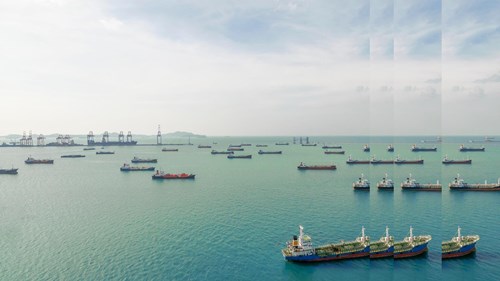Russian countermeasures getting more comprehensive
+++ Update 14.03.2022 +++
Export bans / threatened expropriation of foreign investors
In response to the sanctions imposed on Russia by the US, the EU and other countries, the Russian Federation has expanded its countermeasures designed to protect the Russian economy.In particular, new measures were introduced by the Decree of the President of Russia No. 100 dated 9 March 2022 ("Decree 100") and by the Order of the Russian Government No. 311 dated 11 March 2022.
Export ban for numerous products
While the previous Russian countermeasures were mainly aimed at stopping the flow of capital out of Russia, the Russian government has now imposed an export ban on a large variety of goods. The ban is intended to prevent a "flight of goods" - including telecommunications, medical, automotive, agricultural and electrical equipment as well as timber products - and to ensure the "uninterrupted functioning of key sectors of the Russian economy". The list of goods that can no longer be exported to the EU and the USA, among others, includes more than 200 products. Oil and gas are not among them. The export ban was initially imposed until 31 December 2022.
While the export ban is probably of minor significance for companies based in the EU and the US, it complicates the situation for subsidiaries of Western companies in Russia. They are now prevented from selling stock to customers in the EU or the USA. However, in view of the current lack of Russian customers and the weakness of the rouble, such sales would be necessary as measures to secure liquidity (also as part of the preparation for an orderly solvent withdrawal from Russia).
Draft law on the quasi-expropriation of foreign investors
On 9 March, the Russian government passed a draft law allowing Russian companies with foreign shareholdings to be placed under external management. The respective companies must have a balance sheet value of 1 billion roubles (approx. 7 million euros, based on the EUR/RUB exchange rate of 11.3.2022) and at least 100 employees. In addition, they must be linked to so-called "unfriendly states" (i.e. states that have imposed sanctions against Russia). Such a link exists if foreign companies from "unfriendly states" control the relevant Russian company (the "Company") or hold at least 25% of the Company's shares.
According to the draft law, there are two reasons for introducing external management:
- The management bodies of the Russian Company concerned or its shareholders/participants have effectively ceased managing the company's business in violation of legal requirements. For example, the management has left Russia, leaving the Company without management "contrary to the interests of the company"; or actions/omissions have been committed that significantly reduced the value of the Company's assets, rendered the Company unable to meet its obligations, or forced it to cease operations in violation of legal requirements
- The management bodies of the Russian Company concerned or its shareholders/participants have taken actions that may lead to an unjustified cessation of the Company's activities, its liquidation or insolvency. According to the draft law, this could be the case, for example, if the cessation of the Company's activities was publicly announced without obvious economic reasons, contracts that are essential for the operation of the Company were terminated or measures were initiated to dismiss more than 1/3 of the workforce.
The decision to appoint external management is made by the court on the basis of a request from the Russian Federal Tax Service or a member of the Company's supervisory board. The Tax Service makes the application on the basis of a decision of the Committee of the Ministry of Economic Development, which in turn may be taken at the request of the head of the region in which the Company is located, the competent minister, the public prosecutors and some other officials.
External management is carried out by the state development company VEB.RF or, if the Company is a financial institution, by the DIA (Deposit Insurance Agency).
The draft law provides for the Russian Company concerned to be reorganised following external administration in the form of a demerger or spin-off: The assets of the company are thereby transferred to a newly founded company. The shares in this newly formed company are then sold by the external administrator by auction and the original Company is liquidated.
+++ Update 07.03.2022 +++
Mandatory Sale of Currency Proceeds
According to Decree 79, Russian currency residents (first of all, Russian companies) are obliged to sell 80% of foreign currency received under “external trade” contracts with non-residents (e.g. foreign companies or citizens) on transfer of goods, IP or information to non-residents, or rendering of services or works for non-residents.
Decree 79 requires Russian currency residents, which engage in foreign economic activities (presumably legal entitles incorporated in Russia), to sell 80% of the foreign currency proceeds received from those activities in their accounts with Russian banks on the basis of “foreign trade” export contracts with non-Russian currency residents.
From 28 February 2022, Russian residents must perform such sale of foreign currency not later than 3 business days from the day such proceeds were credited to their accounts. This requirement also applies to proceeds credited to accounts of the residents from 1 January until 27 February 2022. Such proceeds must be sold not later than 3 business days from the day Decree 79 entered into effect, i.e. 28 February 2022.
The above requirement covers all external contracts between residents and non-residents, irrespective of whether such contracts were registered at Russian banks or not.
The mandatory sale of foreign currency will be performed according to procedure established by the Bank of Russia. No such procedure has been introduced yet.
Transactions with Real Estate and Securities, RUB Loans
According to Decree 81, from 2 March 2022 certain transactions (operations) with respect to securities (including shares in Russian joint stock companies) and real estate between Russian residents and Persons Related to Unfriendly States (as defined below) are subject to obtaining of permits from the Governmental Commission on Control over Foreign Investments (the “Governmental Commission”). The restriction applies to transactions that result in appearance of the ownership title on the securities or real estate.
Persons Related to Unfriendly States are persons related to foreign states that perform unfriendly actions with respect to Russian entities and individuals. Such persons include (i) foreign persons related to such states (including if they have citizenship of such states, or such states are place of their registration, place of predominant doing business or place of predominant making profit for them), or (ii) persons controlled by such foreign persons irrespective of place of their registration or predominant doing business.
The restriction seems to apply to the above transactions irrespective of whether Persons Related to Unfriendly States are sellers or purchasers. This also potentially covers transactions entered into before 2 March 2022, but not consummated yet.
The restriction also extends to such transactions (operations) with foreign persons that are not Persons Related to Unfriendly States, if the relevant securities or real estate were acquired by such persons from Persons Related to Unfriendly States after 22 February 2022.
The above permits of the Governmental Commission can, if necessary, contain conditions of making/performance of such transactions (operations). The Government must establish the order of issue of the permits within 5 days from the time Decree 81 entered into effect, i.e. 1 March 2022.
Foreign Currency and RUB Loans with Non-Residents
From 1 March 2022, Decree 79 prohibits currency operations related to provision by Russian residents to non-residents of foreign currency under loan agreements. According to Decree 81 such transactions can be however made/performed based on permits issued by the Governmental Commission.
According to comments of the Bank of Russia cited in mass media, “the prohibition on provision of currency loans to non-residents shall apply only to new loans and shall not apply to servicing the current debt.” We therefore believe the restriction applies only to granting of new loans by Russian residents-lenders to borrowers – non-residents. Due to some uncertainty of the wording of the Decree however, this restriction can be interpreted broadly by Russian banks.
According to Decree 81, as from 2 March 2022 permits of the Governmental Commission are required for transactions (operations) on provision of RUB loans to Persons Related to Unfriendly States, if such provision is not prohibited by other regulations.
Sales of Securities
From 28 February 2022, the Bank of Russia prohibited brokers to perform sales of securities at instructions of foreign legal entities or individuals (non-residents).
Ban of Dividends and Other Payments under Securities
Instructions of the Bank of Russia dated 28 February prohibited payments of dividends to foreign persons. Although the instructions applies only to registrars of joint stock companies, many Russian banks suspended any dividend payments (also from limited liability companies) to foreign persons.
Instructions of the Bank of Russia dated 28 February also prohibited depositaries and registrars to transfer any incomes under securities of Russian issuers to foreign persons.
Ban of Repayment of Loans and Payments under Financial Instruments
The decree of the President of Russia dated 5 March prohibited Russian residents to repay loans to Persons Related to Unfriendly States in amounts exceeding RUB 10 mio. (equivalent of approx. USD 95k) per month. The relevant funds may be credited by Russian residents to Russian bank accounts opened for Persons Related to Unfriendly States in Rubles upon request of Russian residents. This will be treated as a due performance of the obligations.
The same procedure applies to payments to Persons Related to Unfriendly States under Financial Instruments issued by Russian residents.
Cash Export
From 2 March 2022 Decree 81 prohibits export from Russia of foreign currency in cash in foreign currency in the amount exceeding USD 10,000.
Threats of Insolvency Proceedings and Criminal Liability for Termination of Business Activities by Foreign Investors
According to the statements to Russian mass media by Mr. Belousov, deputy Head of the Russian Government, on 4 March, suspension of activities in Russia by a foreign investor (closing a production, etc) will be treated by the Russian authorities as intentional insolvency. According to Mr. Belousov, in such case insolvency proceedings over the relevant enterprise will be commenced by the authorities.
It should be also noted that intentional insolvency is a crime prohibited by Article 196 of the Criminal Code punishable up to 7 years imprisonment.
The information is being monitored and updated.
For more information please visit our Ukraine-Russia Crisis Center
Well
informed
Subscribe to our newsletter now to stay up to date on the latest developments.
Subscribe now








